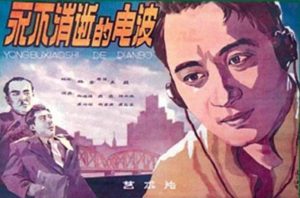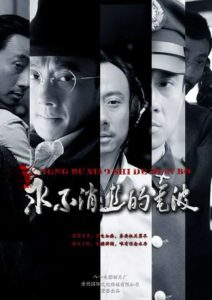Eternal Wave
密战
China, 2017, colour, 2.35:1, 101 mins.
Director: Zhong Shaoxiong 钟少雄 [Billy Chung].
Rating: 5/10.
Formulaic WW2 spy drama runs on empty, with generic action, wooden acting and big sets.
Shanghai, 1937. The Nationalist army is suffering defeats and the Japanese military presence in China is still increasing. Qin Fengwu (Ren Dahua), spy chief for the puppet Shanghai government, sends Japanese troops to raid the HQ of Shanghai Minsheng Newspaper which also operates as a Communist cell. In one go, the underground resistance in the city is wiped out. To re-form it, political commissar Lin Xiang (Guo Fucheng), an advocate of radio telegraphy in intelligence gathering, is sent from the CPC’s base in Yan’an. Disguised as a tramp, he scours the ruined newspaper building for radio parts but is surprised by Qin Fengwu and Japanese military intelligence chief Akiyama Masako (Zhang Lanxin); the latter gives chase and Lin Xiang is only rescued by the intervention of young underground worker Cen Zimo (Zhu Yilong), a music student. When Lin Xiang kills two members of the Japanese ultra-nationalist Black Dragon Society who are tailing him, Liang Dong (Zhang Han), a patrolman in the French Concession who is in the pay of the Japanese, is given three days by military commander Yamazaki (Sato Yuko) to find who was responsible. At the same time, Liang Dong watches helplessly as his childhood sweetheart He Lanfang (Zhao Liying), a textile worker in the Communist underground, is almost raped by a Japanese soldier in the same restaurant. Lin Xiang succeeds in making a radio transmitter from spare parts and makes contact with Cen Zimo, who’s working as a hotel pianist. Meanwhile, Liang Dong manages to save He Lanfang when she’s arrested along with other Communists, though she still can’t accept the fact that he’s working for the Japanese. She is ordered to make contact with Lin Xiang, so the two can pose as a married couple with a clothes-making shop. She teaches him Shanghainese and he teaches Cen Zimo radio telegraphy. When He Lanfang witnesses her best friend, fellow textile worker Wan Bing (Liu Yuexin), shot down in a theatre while making an anti-Japanese demonstration, she wants to pull out, but Lin Xiang persuades her to stay and work as a spy in Shanghai high society. After fellow underground worker Damao (Yu Xiaoguang) sacrifices himself one day, all the group are deeply affected, as well as Liang Dong, who’s already conflicted about working for the Japanese. And then, while transmitting a message about Japan’s planned attack on Pearl Harbor, Lin Xiang is arrested and tortured.
REVIEW
All the lavish production values and constant action can’t hide the fact that Eternal Wave 密战 is running on empty most of the time, with wooden casting, a formulaic script and Hong Kong action-cinema cliches that haven’t changed in 30 years. Mainland funded and produced, but with Hong Kongers among the key crew (director, editor, all three d.p.’s), the Shanghai WW2 spy drama has a production-line feel that feels as tired as the dialogue sounds. As a Communist telegraphist sent to revive the anti-Japanese underground, Hong Kong’s Guo Fucheng 郭富城 [Aaron Kwok] is as unconvincing as – well, the Malaysian Chinese detective in his previous release, Peace Breaker 破•局 (2017) – while Mainland TV actress Zhao Liying 赵丽颖, whose big-screen profile improved with The Rise of a Tomboy 女汉子真爱公式 (2016) and Duckweed 乘风破浪 (2017), is equally wooden as her co-star.
The first Mainland production by Hong Kong journeyman and frequent Wang Jing 王晶 [Wong Jing] collaborator Zhong Shaoxiong 钟少雄 [Billy Chung], Wave was co-produced by Zhong’s Mainland-registered Mufei Cultural Media and actually shot before his two other 2017 releases, Mainland comedy Revenge for Love 疯岳撬佳人 showcasing local comic Yue Yunpeng 岳云鹏 and costume fantasy The Golden Monk 降魔传, the latter co-directed with Wang. Finally released almost two years after the start of shooting in Shanghai, it performed poorly, hawling in a mere RMB79 million.
 To appreciate the woodenness of Guo’s performance – reportedly the first time he’s played a real-life character – one has only to compare that by Sun Daolin 孙道临 in the movie it’s a remake of – The Unfailing Beam 永不消逝的电波 (1958, aka The Eternal Wave, see poster, left), one of the better films by late actress-turned-director Wang Ping 王苹 (1916-90), who also co-directed the interesting Sentinels under the Neon Lights 霓虹灯下的哨兵 (1964). Beyond the regulation speeches, Sun had an engaging chemistry with co-star Yuan Xia 袁霞 as two Communist agents posing as husband and wife; the script even found time for some comedy and tenderness in the situation, even though it was quick to marry the pair as soon as possible. In contrast, Guo and Zhao go about their business with a mechanical precision that’s good-looking but soulless.
To appreciate the woodenness of Guo’s performance – reportedly the first time he’s played a real-life character – one has only to compare that by Sun Daolin 孙道临 in the movie it’s a remake of – The Unfailing Beam 永不消逝的电波 (1958, aka The Eternal Wave, see poster, left), one of the better films by late actress-turned-director Wang Ping 王苹 (1916-90), who also co-directed the interesting Sentinels under the Neon Lights 霓虹灯下的哨兵 (1964). Beyond the regulation speeches, Sun had an engaging chemistry with co-star Yuan Xia 袁霞 as two Communist agents posing as husband and wife; the script even found time for some comedy and tenderness in the situation, even though it was quick to marry the pair as soon as possible. In contrast, Guo and Zhao go about their business with a mechanical precision that’s good-looking but soulless.
The film started production under the original’s Chinese title (which refers to the power of radio waves), only switching to its present one (meaning “Secret War”) at the last moment. As a re-make, it retains only the bare bones of the story – based on real-life agent Li Bai 李白 (1910-49) – plus key scenes like the shooting of an underground worker in a theatre, the Japanese tactic of blacking out sectors of the city to trace radio messages, and the main character being tortured in a suitably fiendish Nipponese dungeon. Apart from those moments, the script by Mainland academic Jiang Yunmo 江云默 and Hong Kong action-movie specialist Zhang Tan 张炭, has almost nothing in common with the 1958 production.
Characters stitched in this time include a conflicted quisling who makes his first appearance in a Sherlock Holmes cape and deerstalker (Zhang Han 张翰, bland), a high-kicking Japanese nasty (foxy taekwondo champion-turned-actress Zhang Lanxin 张蓝心) and a foppish turncoat (Hong Kong veteran Ren Dahua 任达华 [Simon Yam]). The leggy Zhang’s physical agility (CZ12 十二生肖, 2012; Railroad Tigers 铁道飞虎, 2016) and the over-dressed Ren’s fruity playing (complete with a Hercule Poirot moustache) are both guilty pleasures in a film that’s far happier when it’s trashily going over the top.
 The frequent action is well staged on a generic level across rooftops and other lavish sets, and professionally cut by Hong Kong’s Zhong Weizhao 钟炜钊 [Azrael Chung], earning the film an extra point. The same story was earlier made into a 34-part Mainland TV drama, 永不消逝的电波 (2010), starring Zhao Lixin 赵立新 and Jiao Junyan 焦俊艳 (see poster, left).
The frequent action is well staged on a generic level across rooftops and other lavish sets, and professionally cut by Hong Kong’s Zhong Weizhao 钟炜钊 [Azrael Chung], earning the film an extra point. The same story was earlier made into a 34-part Mainland TV drama, 永不消逝的电波 (2010), starring Zhao Lixin 赵立新 and Jiao Junyan 焦俊艳 (see poster, left).
CREDITS
Presented by Nanhai Film (CN), Beijing Fenggu Cultural Communication (CN). Produced by Beijing Fenggu Cultural Communication (CN), Beijing Mufei Cultural Media (CN).
Script: Zhang Tan, Jiang Yunmo, Li Zherui. Story: Jiang Yunmo. Photography: Wu Wenzheng, Zhang Wenbao, Gao Zhaolin. Editing: Zhong Weizhao [Azrael Chung], Zheng Lvnan. Music: Ren Yajing, Wang Fu. Music direction: Hu Weili, Ren Yajing. Art direction: Liu Qing. Costumes: Wang Juewen. Styling: Chen Tongxun. Sound: Lin Siyu, Zhou Yi. Action: Li Dachao. Martial arts: Han Ping. Visual effects: Li Zifei, Yu Ridong (Herbgarden).
Cast: Guo Fucheng [Aaron Kwok] (Lin Xiang), Zhao Liying (He Lanfeng), Zhang Han (Liang Dong), Zhang Lanxin (Akiyama Masako), Ren Dahua [Simon Yam] (Qin Fengwu), Liu Yuexin (Wan Bing), Zhu Yilong (Cen Zimo), Yu Xiaoguang (Damao), Li Bin (Balazi), Jonathan Kos-Read (Pierre, French pilot), Xi Meijuan (Liang Dong’s mother), You Liping (Guan, company president), An Yaping (old commander), Kou Zhenhai (Sun), Sun Yaowei (Hu Fei, CPC member), Tu Liman (Qin Fengwu’s concubine), Ai Ru (Keiko), He Gang (Li Gang), Sato Yuko (Yamazaki, colonel), Tsukagoshi Hirotaka (Oda), Xu Weidong (Zhang Feng, CPC member), Lin Yajun (Xu Yong, CPC member).
Release: China, 3 Nov 2017.
